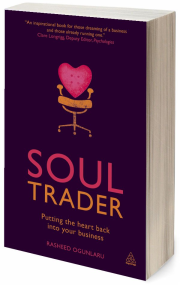I’ve always talked about the importance of giving people rich, positive feedback and it’s wonderful just what an impact it can have. But it’s something you really only appreciate when you hear that feedback first hand. I remember getting ‘honest’ but positive feedback from my English teacher many years ago that really impacted on me positively and actually encouraged me back then in my dream of being an author…
…Many years on his has been a very busy and touching week, with the publication of my new book Soul Trader on Wednesday. Tuesday was especially busy -pre-publication days often are – and the British Library’s Business & IP Centre ran a wonderful Open Evening to tie in with publication in which I shared tips from the book that was open to new and emerging entrepreneurs. It was a truly magical evening and was very humbling to hear people you respect offer warm genuine praise. That was an opportunity for me to feedback and encourage the many emerging entrepreneurs . And during that evening I got to hear some very touching positive feedback.
That day on the way in to the centre I realised that I better quickly read the first review of the book by the BIPC Centre Manager Neil Infield on his much respected and well read blog In Through the Outfield. I was very touched by what he wrote below.
Here is Neil’s Review from In Through The Outfield:
Soul Trader – Putting the heart back into your business
 Rasheed Ogunlaru, life and business coach has been a Business & IP Centre partner since our earliest days. In addition to running the Your life, your business workshop once a month in the Centre and mentoring aspiring entrepreneurs with TieUK, he singlehandedly converted me to the benefits of life coaching.
Rasheed Ogunlaru, life and business coach has been a Business & IP Centre partner since our earliest days. In addition to running the Your life, your business workshop once a month in the Centre and mentoring aspiring entrepreneurs with TieUK, he singlehandedly converted me to the benefits of life coaching.
I have to admit that perhaps due to a scientific background, or perhaps just plain old cynicism, I had always been wary of life coaching. I decided the only way to address this prejudice was to attend Rasheed’s workshop five years ago. After three hours I was entirely convinced by his eminently practical approach, to putting your heart and soul into your business.
So it is great to see his practical philosophy translated from workshop to published book in the form of Soul Trader published by Kogan Page. And having read it through this week, I would put it at the top of my list of recommended reading for everyone starting (or growing) a business. I am still a big fan of Starting Your Own Business: The Good, The Bad and The Unexpected by David Lester, but Rasheed has addressed the key issue of what you really want to get from starting a business, and to make sure you end up running it, instead of it running you and your life.
 His introduction sums it up nicely:
His introduction sums it up nicely:
Most people do not go into business solely to make money. They want to make a living, make an impact, make a contribution, make a statement, make something of real worth and value. They want to enjoy what they do, and make themselves happy and their families secure and proud. They want to make a break from the humdrum, and express their skill and abilities. But sooner or later many business owners fall into the same old trap, lose sight of what’s important and struggle with life balance.
The book consists of eight C’s made up of seven chapters and a ‘plus’ which focusses on insights to help anticipate and embrace Change.
- Clarity: Know your mission, talents and values.
- Customers: See life through customers’ eyes to win their custom and loyalty.
- Courage: Unleash your inspiration / wisdom and adopt an athlete’s attitude.
- Co-operation: Punch over your weight; collaborate. Use / build your network.
- Conversations: Learn the art to connect, converse, create and convert leads.
- Creativity: Know when to work, rest and be at your best, (re)gain life balance.
- Compassion: Connect from the heart – be transformational not transactional.
Early on Rasheed gets the you to conduct a personal SWOT analysis. Which is an excellent way of discovering what you do well, and what you need to work on or get help with.
 The book is peppered with examples from his hundreds of clients over the years, and covers a problem I have encountered many times, which he calls the ‘blindness of the visionary’. People become so (understandably) obsessed by their business idea or invention, they completely forget about their customers. This leads to a very expensive and risky approach to market research, where you bring your product or service to the market and then find out if anyone will buy it. Much better to find out as you develop your idea and tailor it to what you customers say they want.
The book is peppered with examples from his hundreds of clients over the years, and covers a problem I have encountered many times, which he calls the ‘blindness of the visionary’. People become so (understandably) obsessed by their business idea or invention, they completely forget about their customers. This leads to a very expensive and risky approach to market research, where you bring your product or service to the market and then find out if anyone will buy it. Much better to find out as you develop your idea and tailor it to what you customers say they want.
Once again Rasheed gives a practical solution to this problem by showing how to map out your customers. He also explains how to develop a set of customer ‘scenarios’, to help understand the psychology of your customers. He doesn’t shy away from the realities of doing business in the real world as a soul trader. Without sufficient income (and avoiding the number one cause of failure – cash-flow) your business will not survive. Even social enterprises have to generate enough money to pay their staff and to invest in growth if they are to succeed. These are the hard questions that so many avoid tackling in their business plans:
- How much money to you need to live on, and to break even in business?
- How much money do you seek to make this year, next year and the year after in turnover – before costs and tax – and in your personal profit after cost and tax?
- On average how many sales or customer does that equate to per month and year?
- What specific action are needed to reach those goals, and what are the challenges?
- What evidence, research and assumptions are those figures based on?
- Looking again at those figures, what are a) realistic, b) optimistic and c) pessimistic sales figures for the next 12 months, and what would they mean to you and your business?
- What are your main products and services? How are they priced? What are all the costs involved? Which are the most lucrative? Which incur the most costs? Which involve the most hard work? Which are most dear to your heart and to your customers?
I have been talking to lots of makers recently such as jewellers, and many haven’t properly come to terms with the issue of wanting to make everything by hand themselves, but also selling enough items to make a living.
 Courage is term one doesn’t come across often in business books, but Rasheed rightly recognises that this is an essential ingredient in business, and gives practical tips on how you can develop it. I am constantly in awe of the people I meet who are at the beginning of a journey that would terrify me. The book contains an example from ex-Dragon and Business & IP Centre supporter Rachel Elnaugh.Rasheed asked one simple question during an advice session, and at a stroke gave her an insight which revolutionised her life. “I can honestly say that session with Rasheed was like walking through a doorway that has led me into a completely new and completely fulfilling life where success, money and love are all now flowering.”
Courage is term one doesn’t come across often in business books, but Rasheed rightly recognises that this is an essential ingredient in business, and gives practical tips on how you can develop it. I am constantly in awe of the people I meet who are at the beginning of a journey that would terrify me. The book contains an example from ex-Dragon and Business & IP Centre supporter Rachel Elnaugh.Rasheed asked one simple question during an advice session, and at a stroke gave her an insight which revolutionised her life. “I can honestly say that session with Rasheed was like walking through a doorway that has led me into a completely new and completely fulfilling life where success, money and love are all now flowering.”
Cooperation is an undervalued aspect of business, with many people I meet worrying about their competition before they have even started trading. The book talks about the importance of developing business partnerships through cooperation. And again Rasheed gives practical advice on how to grow and then utilize your support networks.
Conversations, which convert contacts into customers replace the ‘hard sell’ for soul traders. After all, no-one wants to be sold to, but everyone wants their opinion to be listened to. This chapter also includes how conversations work via social media channels and what precautions you need to take them online. There a lots of practical examples here, including how to deal with complaints by using, Acknowledge – Reflect back – Say what you can do.
Towards the end of the book Rasheed introduces his two-page business plan. As he says, ‘Business plans are written for two purposes and for two audiences: 1) for you to identify who and where you are, where you’re going and how you’ll get there; and 2) for investors or funders for the same purpose. If you’re seeking funding from others then you’ll need a longer, more detailed business plan…”
To sum up, I found Soul Trader to be clear and simple, friendly and supportive, passionate and soulful – just like Rasheed himself.

Recent Comments